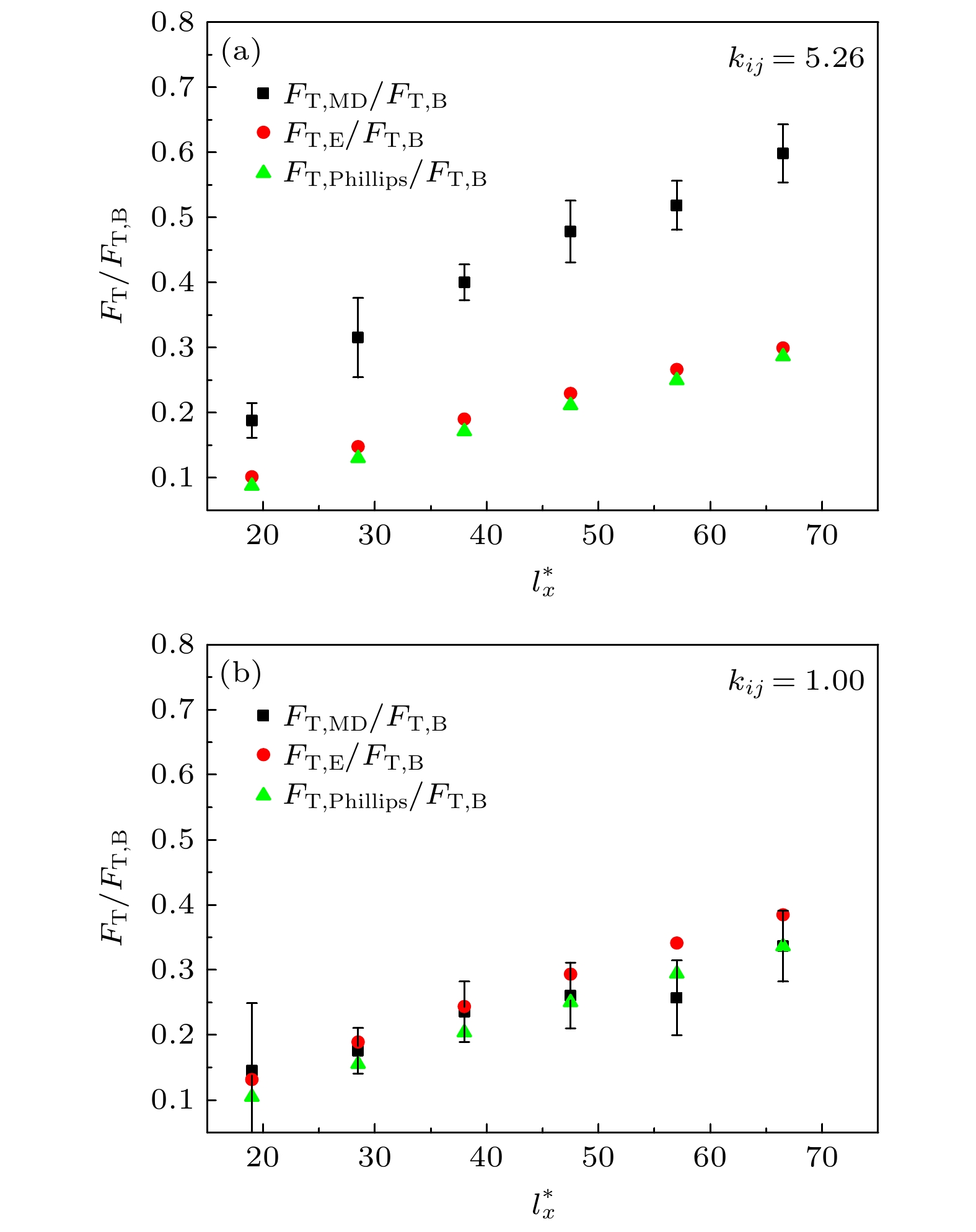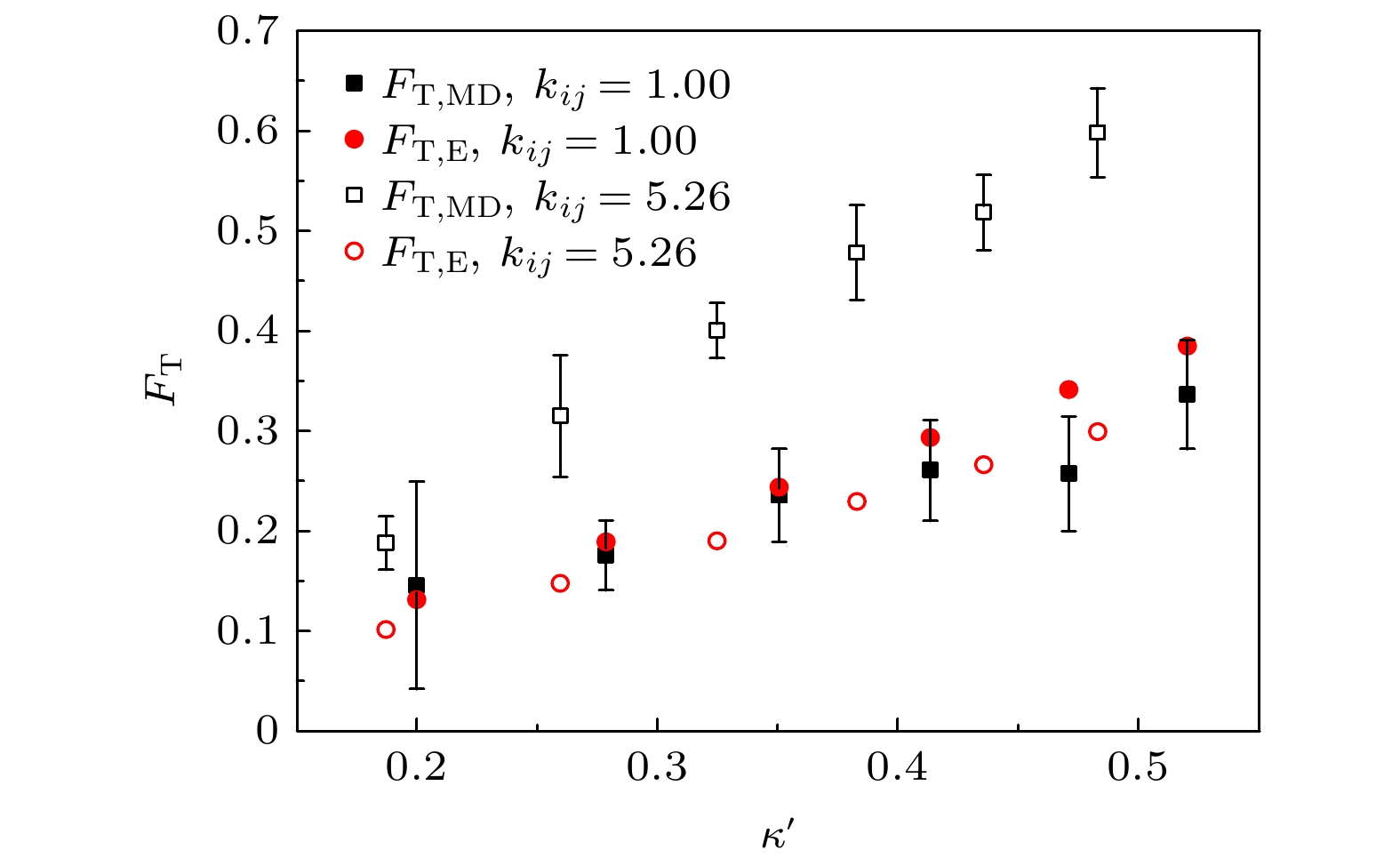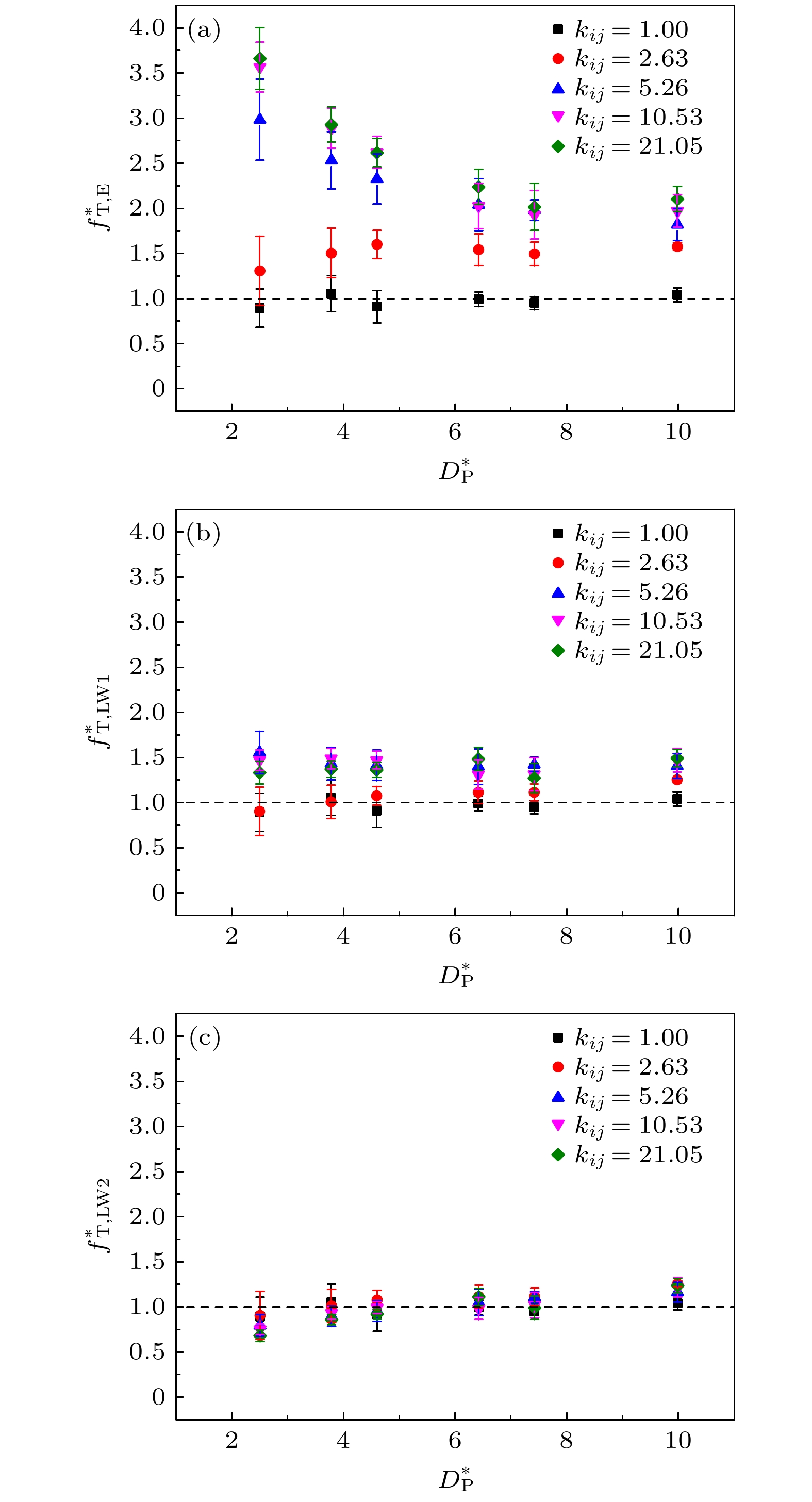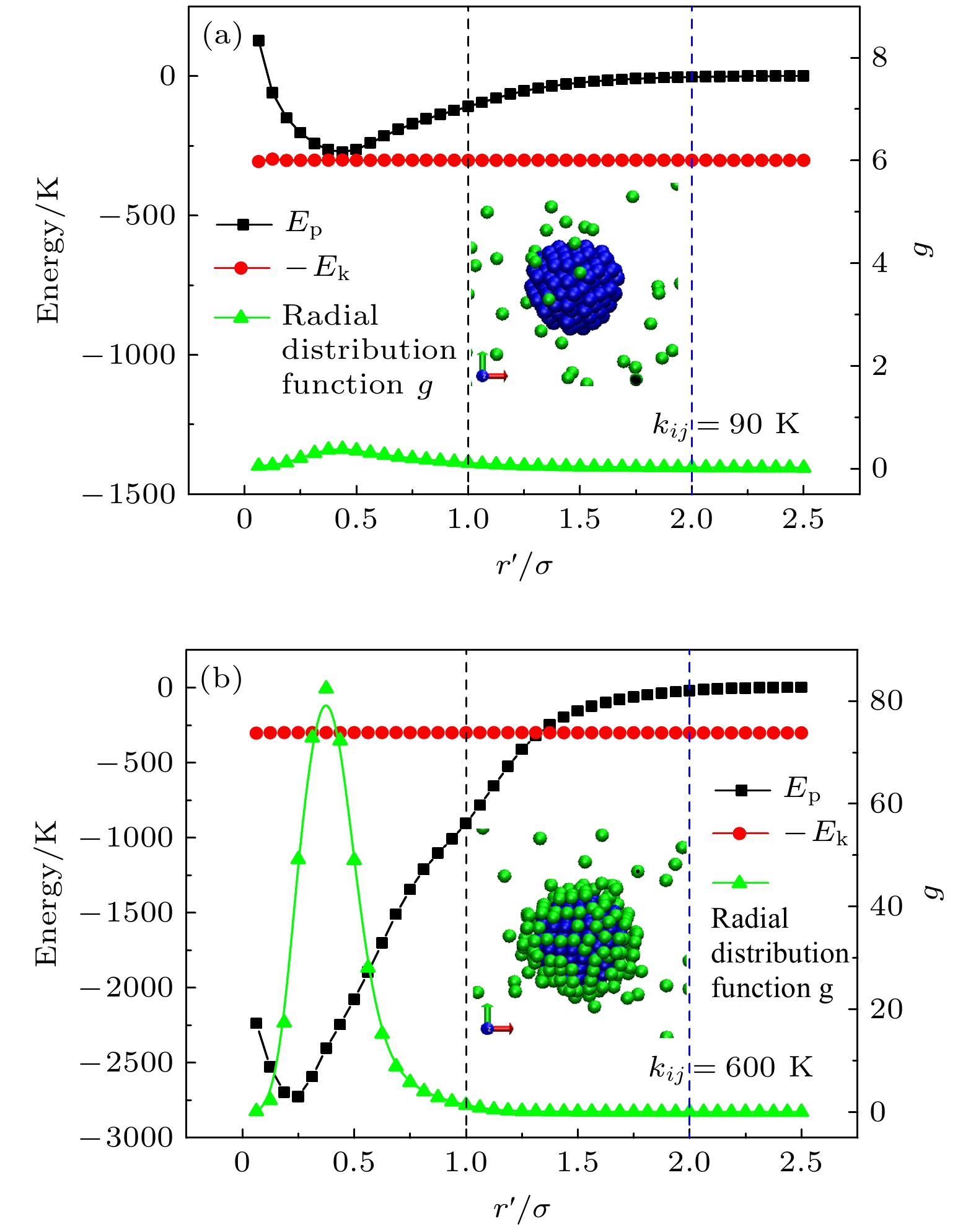-
Thermophoresis refers to the motion of small particles suspending in a fluid with non-uniform temperature distribution due to the temperature gradient around the particle. Usually, the fluid molecules coming from the hot side carry more kinetic energy than those from the cold side, which results in a net thermophoretic force in the direction opposite to the temperature gradient. Since it was discovered more than 100 years ago, thermophoresis has been of major importance in a variety of applications, where it can play either beneficial role or adverse role, including material synthesis, micro- and nano-fabrication, and environmental science. Therefore, it is necessary to accurately evaluate the thermophoretic force. In the present work, the thermophoretic force on nanoparticles is examined in the free molecule regime by using non-equilibrium molecule dynamics (MD) simulation. It has been widely accepted that the thermophoretic force conforms with the Waldmann equation for large Knudsen numbers. However, due to the effect of the nonrigid-body interactions between the particle and gas molecules, the thermophoretic force on nanoparticles might deviate greatly from the classical theory. In our MD model, a single nanoparticle with a diameter of several nanometers suspends in a diluted gas. The Lennard-Jones (L-J) potential is employed to simulate the intermolecular interactions. To avoid deforming the nanoparticle, the solid molecules within the nanoparticles are linked to their nearest neighbors through a finite extensible nonlinear elastic bonding potential. The thermophoretic force on a nanoparticle is calculated by imposing a harmonic potential on the nanoparticle, which eliminates the effect of the Brownian motion of the nanoparticle on the thermophoresis. The effective thermal conductivity of the ambient gas is employed in Waldmann equation for the thermophoretic force due to the finite volume effect. It is found that the Waldmann theory for thermophoresis is still valid for nanoparticles in the case of weak gas-particle interaction or high gas temperature. With the increase of the gas-particle interaction strength or the decrease of the gas temperature, the Waldmann theory is invalid due to the effect of gas-particle nonrigid-body collisions and the adsorption of gas molecules on the particle surface. By considering the gas-particle nonrigid-body interaction and the modified particle size, the theoretical results for thermophoretic force accord with the MD simulations quite well.
-
Keywords:
- nanoparticle /
- thermophoretic force /
- molecular dynamics /
- free molecule regime
[1] Cadle R D 1967 Science 157 1548
[2] Zheng F 2002 Adv. Colloid Interface Sci. 97 255
 Google Scholar
Google Scholar
[3] Tyndall J 1870 Br. Med. J. 547 661
[4] Anderson J L 1989 Annu. Rev. Fluid Mech. 21 61
 Google Scholar
Google Scholar
[5] Vigolo D, Rusconi R, Stone H A, Piazza R 2010 Soft Matter 6 3489
 Google Scholar
Google Scholar
[6] He Y, Tsutsui M, Scheicher R H, Bai F, Taniguchi M, Kawai T 2013 ACS Appl. Nano Mater. 7 538
 Google Scholar
Google Scholar
[7] Wienken C J, Baaske P, Rothbauer U, Braun D, Duhr S 2010 Nat. Commun. 1 100
 Google Scholar
Google Scholar
[8] Messerer A, Niessner R, Pöschl U 2003 J. Aerosol Sci. 34 1009
 Google Scholar
Google Scholar
[9] Gomez A, Rosner D E 1993 Combust. Sci. Technol. 89 335
 Google Scholar
Google Scholar
[10] Iacopini S, Rusconi R, Piazza R 2006 Eur. Phys. J. E 19 59
 Google Scholar
Google Scholar
[11] Wang J, Li Z 2012 Phys. Rev. E 86 011201
 Google Scholar
Google Scholar
[12] 罗爽, 焦可歆, 刘志宇, 梁深, 戚朋飞, 王军 2015 中国科技论文 10 2083
 Google Scholar
Google Scholar
Luo S, Jiao K X, Liu Z Y, Liang S, Qi P F, Wang J 2015 China Sciencepaper 10 2083
 Google Scholar
Google Scholar
[13] Brenner H 2005 Phys. Rev. E 72 061201
 Google Scholar
Google Scholar
[14] 徐东艳, 陈熙 2001 工程热 22 721
 Google Scholar
Google Scholar
Xu D Y, Chen Xi 2001 J. Eng. Thermophys. 22 721
 Google Scholar
Google Scholar
[15] Li W, Davis E J 1995 J. Aerosol Sci. 26 1063
 Google Scholar
Google Scholar
[16] Li Z, Wang H 2004 Phys. Rev. E 70 021205
 Google Scholar
Google Scholar
[17] Li Z, Wang H 2003 Phys. Rev. E 68 061206
 Google Scholar
Google Scholar
[18] Li Z, Wang H 2003 Phys. Rev. E 68 061207
 Google Scholar
Google Scholar
[19] Epstein P S 1929 Z. Physik 54 537
 Google Scholar
Google Scholar
[20] Brock J R 1962 J. Colloid Sci. 17 768
 Google Scholar
Google Scholar
[21] Sone Y 1977 Rarefied Gas Dyn. 1 417
[22] Rosenblatt P, Lamer V K 1946 Phys. Rev. 70 385
 Google Scholar
Google Scholar
[23] Saxton R L, Ranz W E 1952 J. Appl. Phys. 23 917
 Google Scholar
Google Scholar
[24] Schadt C F, Cadle R D 1961 J. Phys. Chem. 65 1689
 Google Scholar
Google Scholar
[25] Waldmann L 1959 Z. Naturforsch. A 14 589
 Google Scholar
Google Scholar
[26] Brock J R 1967 J. Colloid Interface Sci. 23 448
 Google Scholar
Google Scholar
[27] Talbot L, Cheng R K, Schefer R W, Willis D R 1980 J. Fluid Mech. 101 737
 Google Scholar
Google Scholar
[28] Tsuji T, Iseki H, Hanasaki I 2017 J. Phys.: Condens. Matter 29 475101
 Google Scholar
Google Scholar
[29] Li Z 2009 Phys. Rev. E 80 061204
 Google Scholar
Google Scholar
[30] Galliero G, Volz S 2008 J. Chem. Phys. 128 6330
 Google Scholar
Google Scholar
[31] Vladkov M, Barrat J L 2020 Macromol. Theory Simul. 15 252
 Google Scholar
Google Scholar
[32] Tsuji T, Iseki H, Hanasaki I 2016 Rarefied Gas Dyn. 1786 110003
 Google Scholar
Google Scholar
[33] 李杰杰, 鲁斌斌, 线跃辉, 胡国明, 夏热 2018 67 056101
 Google Scholar
Google Scholar
Li J J, Lu B B, Xian Y H, Hu G M, Xia R 2018 Acta Phys. Sin. 67 056101
 Google Scholar
Google Scholar
[34] Wang J, Luo S, Xia G 2017 Phys. Rev. E 95 033101
 Google Scholar
Google Scholar
[35] Kröger M 2004 Phys. Rep. 390 453
 Google Scholar
Google Scholar
[36] Hanasaki I, Nagura R, Kawano S 2015 J. Chem. Phys. 142 104301
 Google Scholar
Google Scholar
[37] Hanasaki I, Fujiwara D, Kawano S 2016 J. Chem. Phys. 144 094503
 Google Scholar
Google Scholar
[38] Barker, J. A 1966 J. Chem. Phys. 44 4206
 Google Scholar
Google Scholar
[39] Bird R B 2002 Appl. Mech. Rev 55 R1
 Google Scholar
Google Scholar
[40] Li F, Wang J, Xia G, Li Z 2019 Nanoscale 11 13051
 Google Scholar
Google Scholar
[41] Phillips W F 1972 Phys. Fluids 15 999
 Google Scholar
Google Scholar
[42] Woodcock L V 1971 Chem. Phys. Lett. 10 257
 Google Scholar
Google Scholar
-
图 5 不同参数下热泳力的分子动力学结果FT,MD与Waldmann公式结果FT,E比较图 (a) 环境温度T*; (b) 气-固结合强度kij; (c) 温度梯度
$ \nabla T^* $ Figure 5. The variation of thermophoretic force FT between present MD simulation result FT, MD and Waldmann equation result FT, E under different parameters: (a) The environ-ment temperature
$ T_{0}^* $ ; (b) the intensity of gas-particle interaction kij; (c) temperature gradient$ \nabla T^* $ .图 6 无量纲热泳力
$f_{{\rm{T}}}^* $ 随颗粒直径$D_{{\rm{P}}}^* $ 变化图 (a)刚体碰撞模型; (b) 非刚体碰撞模型FT = FT, LW1; (c) 非刚体碰撞模型FT = FT, LW2(考虑气体分子吸附引起的颗粒尺寸变化)Figure 6. The dimensionless thermophoretic force
$f_{{\rm{T}}}^* $ as a function of$D_{{\rm{P}}}^* $ for different gas-particle interaction intensity: (a) The rigid body collision model FT = FT, E; (b) the non-rigid body collision model FT = FT, LW1; (c) FT = FT, LW2 (wherein the vary of particle size is considered).表 1 分子动力学模拟系统的几何特征参数
Table 1. Geometric and characteristic parameters of the simulation systems.
$l_{x}^* $ $l_{y}^* $ ($l_{z}^* $) L* $T_{{\rm{h}}}^* $ $T_{{\rm{l}}}^* $ T* KnL 19.00 49.43 7.50 2.67 2.59 2.63 3.311283 28.50 40.36 11.25 2.69 2.57 2.63 2.207522 38.00 34.95 15.00 2.71 2.56 2.63 1.655642 47.50 31.26 18.75 2.73 2.54 2.63 1.324513 57.00 28.54 22.50 2.75 2.52 2.63 1.103761 66.50 26.42 26.25 2.76 2.50 2.63 0.946081 -
[1] Cadle R D 1967 Science 157 1548
[2] Zheng F 2002 Adv. Colloid Interface Sci. 97 255
 Google Scholar
Google Scholar
[3] Tyndall J 1870 Br. Med. J. 547 661
[4] Anderson J L 1989 Annu. Rev. Fluid Mech. 21 61
 Google Scholar
Google Scholar
[5] Vigolo D, Rusconi R, Stone H A, Piazza R 2010 Soft Matter 6 3489
 Google Scholar
Google Scholar
[6] He Y, Tsutsui M, Scheicher R H, Bai F, Taniguchi M, Kawai T 2013 ACS Appl. Nano Mater. 7 538
 Google Scholar
Google Scholar
[7] Wienken C J, Baaske P, Rothbauer U, Braun D, Duhr S 2010 Nat. Commun. 1 100
 Google Scholar
Google Scholar
[8] Messerer A, Niessner R, Pöschl U 2003 J. Aerosol Sci. 34 1009
 Google Scholar
Google Scholar
[9] Gomez A, Rosner D E 1993 Combust. Sci. Technol. 89 335
 Google Scholar
Google Scholar
[10] Iacopini S, Rusconi R, Piazza R 2006 Eur. Phys. J. E 19 59
 Google Scholar
Google Scholar
[11] Wang J, Li Z 2012 Phys. Rev. E 86 011201
 Google Scholar
Google Scholar
[12] 罗爽, 焦可歆, 刘志宇, 梁深, 戚朋飞, 王军 2015 中国科技论文 10 2083
 Google Scholar
Google Scholar
Luo S, Jiao K X, Liu Z Y, Liang S, Qi P F, Wang J 2015 China Sciencepaper 10 2083
 Google Scholar
Google Scholar
[13] Brenner H 2005 Phys. Rev. E 72 061201
 Google Scholar
Google Scholar
[14] 徐东艳, 陈熙 2001 工程热 22 721
 Google Scholar
Google Scholar
Xu D Y, Chen Xi 2001 J. Eng. Thermophys. 22 721
 Google Scholar
Google Scholar
[15] Li W, Davis E J 1995 J. Aerosol Sci. 26 1063
 Google Scholar
Google Scholar
[16] Li Z, Wang H 2004 Phys. Rev. E 70 021205
 Google Scholar
Google Scholar
[17] Li Z, Wang H 2003 Phys. Rev. E 68 061206
 Google Scholar
Google Scholar
[18] Li Z, Wang H 2003 Phys. Rev. E 68 061207
 Google Scholar
Google Scholar
[19] Epstein P S 1929 Z. Physik 54 537
 Google Scholar
Google Scholar
[20] Brock J R 1962 J. Colloid Sci. 17 768
 Google Scholar
Google Scholar
[21] Sone Y 1977 Rarefied Gas Dyn. 1 417
[22] Rosenblatt P, Lamer V K 1946 Phys. Rev. 70 385
 Google Scholar
Google Scholar
[23] Saxton R L, Ranz W E 1952 J. Appl. Phys. 23 917
 Google Scholar
Google Scholar
[24] Schadt C F, Cadle R D 1961 J. Phys. Chem. 65 1689
 Google Scholar
Google Scholar
[25] Waldmann L 1959 Z. Naturforsch. A 14 589
 Google Scholar
Google Scholar
[26] Brock J R 1967 J. Colloid Interface Sci. 23 448
 Google Scholar
Google Scholar
[27] Talbot L, Cheng R K, Schefer R W, Willis D R 1980 J. Fluid Mech. 101 737
 Google Scholar
Google Scholar
[28] Tsuji T, Iseki H, Hanasaki I 2017 J. Phys.: Condens. Matter 29 475101
 Google Scholar
Google Scholar
[29] Li Z 2009 Phys. Rev. E 80 061204
 Google Scholar
Google Scholar
[30] Galliero G, Volz S 2008 J. Chem. Phys. 128 6330
 Google Scholar
Google Scholar
[31] Vladkov M, Barrat J L 2020 Macromol. Theory Simul. 15 252
 Google Scholar
Google Scholar
[32] Tsuji T, Iseki H, Hanasaki I 2016 Rarefied Gas Dyn. 1786 110003
 Google Scholar
Google Scholar
[33] 李杰杰, 鲁斌斌, 线跃辉, 胡国明, 夏热 2018 67 056101
 Google Scholar
Google Scholar
Li J J, Lu B B, Xian Y H, Hu G M, Xia R 2018 Acta Phys. Sin. 67 056101
 Google Scholar
Google Scholar
[34] Wang J, Luo S, Xia G 2017 Phys. Rev. E 95 033101
 Google Scholar
Google Scholar
[35] Kröger M 2004 Phys. Rep. 390 453
 Google Scholar
Google Scholar
[36] Hanasaki I, Nagura R, Kawano S 2015 J. Chem. Phys. 142 104301
 Google Scholar
Google Scholar
[37] Hanasaki I, Fujiwara D, Kawano S 2016 J. Chem. Phys. 144 094503
 Google Scholar
Google Scholar
[38] Barker, J. A 1966 J. Chem. Phys. 44 4206
 Google Scholar
Google Scholar
[39] Bird R B 2002 Appl. Mech. Rev 55 R1
 Google Scholar
Google Scholar
[40] Li F, Wang J, Xia G, Li Z 2019 Nanoscale 11 13051
 Google Scholar
Google Scholar
[41] Phillips W F 1972 Phys. Fluids 15 999
 Google Scholar
Google Scholar
[42] Woodcock L V 1971 Chem. Phys. Lett. 10 257
 Google Scholar
Google Scholar
Catalog
Metrics
- Abstract views: 8592
- PDF Downloads: 162
- Cited By: 0














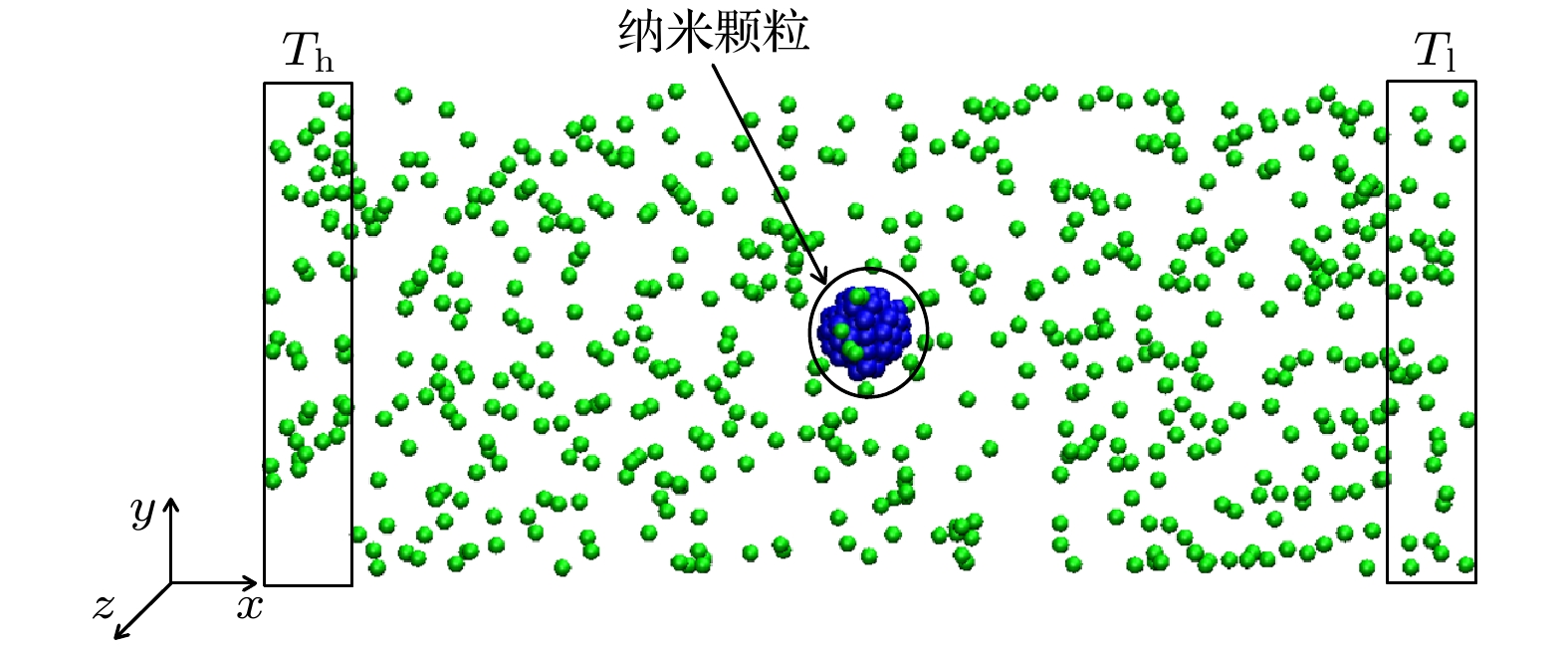
 DownLoad:
DownLoad:

